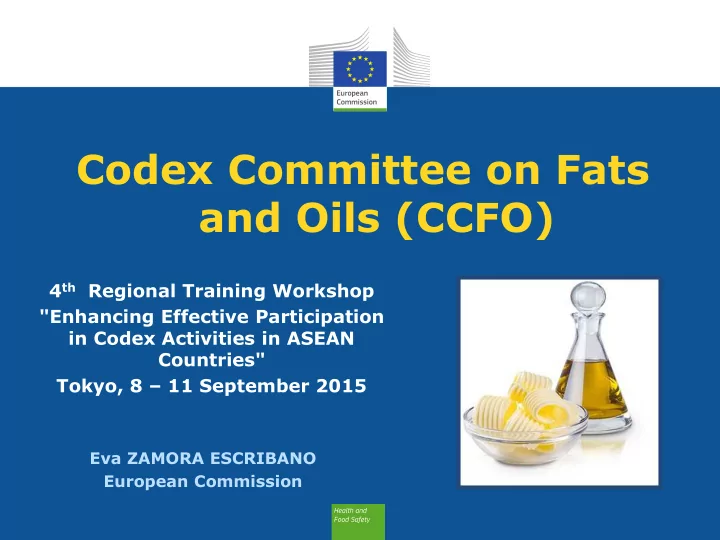

Codex Committee on Fats and Oils (CCFO) 4 th Regional Training Workshop "Enhancing Effective Participation in Codex Activities in ASEAN Countries" Tokyo, 8 – 11 September 2015 Eva ZAMORA ESCRIBANO European Commission
General Information • 1 st session in 1965, United Kingdom • Chaired by Malaysia since 2007 • Acronym: CCFO • Meetings every 2 years • Mandate: To elaborate worldwide standards for fats and oils of animal, vegetable and marine origin including margarine and olive oil.
Codex Committee on Fats and Oils
Standards and related texts Few Standards but big impact on trade
Code of Practice for the Storage and Transport of Edible Fats and Oils in Bulk SCOPE Over 75 million tons Handling, storage and transport of all of edible oils and fats are transported crude or processed edible oils and in bulk by sea each fats in bulk year The quantity of oils imported worldwide has increased from 56 million tons in 2006 to 75 million tons in 2013
Code of Practice for the Storage and Transport of Edible Fats and Oils in Bulk Defines: types of deterioration that can occur in oils and fats during the operations dealt with in this Code Oxidation Hydrolysis Contamination residues of a previous material handled in the equipment, dirt, rain, sea water or through the accidental addition of a different product
Code of Practice: Contamination - residues of a previous material List of Banned List of Immediate Acceptable Previous Previous Cargoes Ad hoc Cargoes Expert meeting 4 Criteria
Cargoes List of Acceptable Previous Revision of the List: Standing Agenda Item of CCFO 93 substances confirmed 1 removed 23 (including a new substance) to be assessed by an ad hoc FAO/WHO expert meeting ENDORSED CAC 38
Code of Practice STORAGE AND TRANSPORTATION Tanks Pipelines OPERATIONS Loading and Unloading Cleaning Maintenance Others Appendix 1 temperatures during storage, transport, loading and discharge
Draft Standard for Fish Oils Good progress at the last CCFO Adopted at Step 5 by CAC 38 inclusion of several named oils within the scope of the Standard and their fatty acid profile (i.e. Menhaden, Salmon and Krill) labelling provisions (e.g. declaration of the percentage of EPA, vitamins, etc) Circular Letter requesting additional information on the fatty acids profiles of anchovy and krill oils and proposals for alternative texts in Section 7.3 “Other Labelling Requirements” Approved Target in 2011 year 2015
Standards and related texts
New work approved Revision of the Standard for Named Vegetable Oils: - Addition of palm oil with high oleic acid (Colombia and Ecuador) -Revision of Fatty Acid Composition and Other Quality Factors of Peanut Oil (Argentina) Revision of the Standard for Olive Oil and Olive Pomace Oil): Revision of Section 3 (Argentina, Australia and Italy)
Future work (I) Amendments to the Standard for Named Vegetable Oils: • Replacement of Acid Value with Free Fatty Acids for Virgin Palm Oils (Malaysia) • Inclusion of Quality Parameters of Crude Rice Bran Oil (India) • Inclusion of Cold Pressed Oils (Iran) • Revision of limits of Oleic and Linoleic Acids of Sunflower Seed Oils (Argentina) Amendment to the Standard for Named Animal Fats inclusion of unrefined edible tallow (Australia) To be decided in February 2017! At CCFO 25
Thank you for your attention Eva ZAMORA ESCRIBANO European Commission
Recommend
More recommend